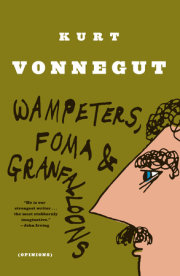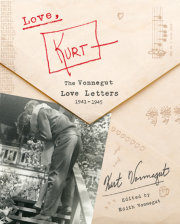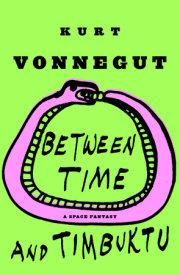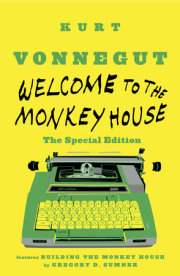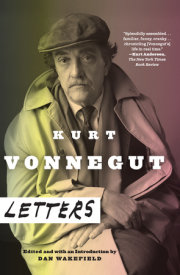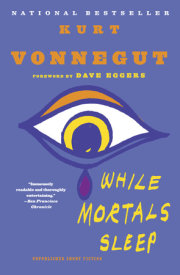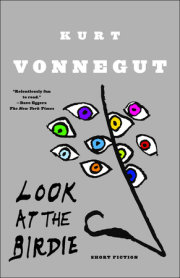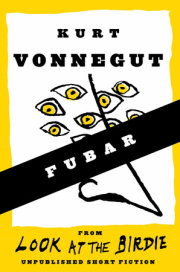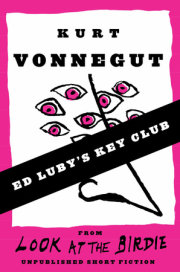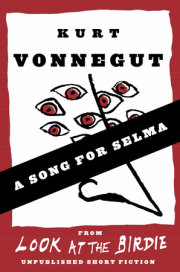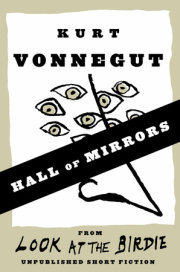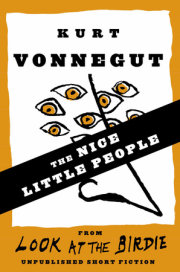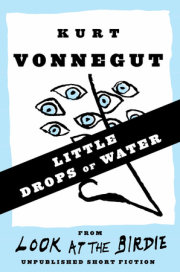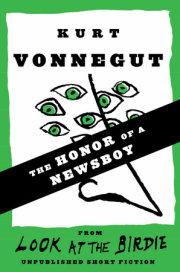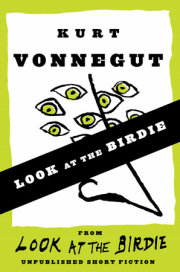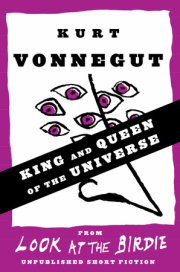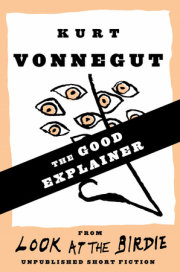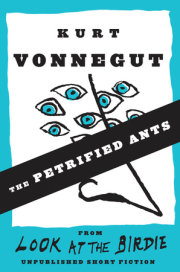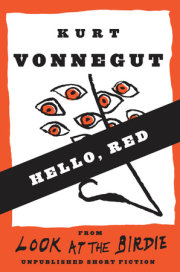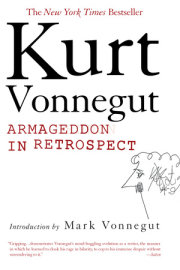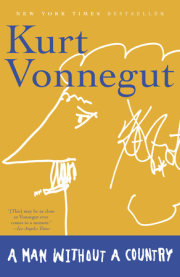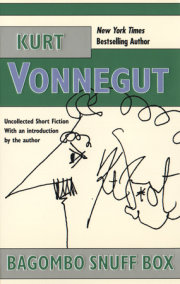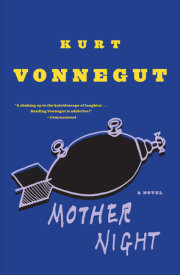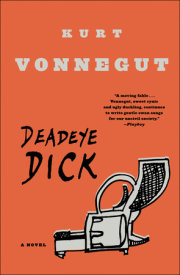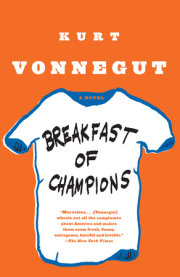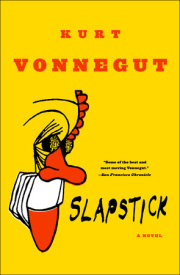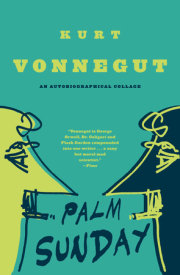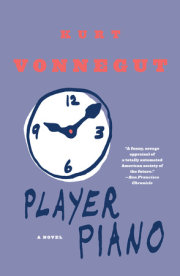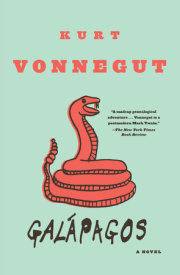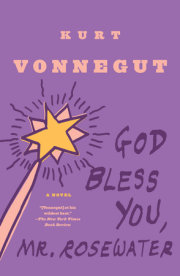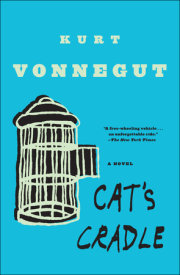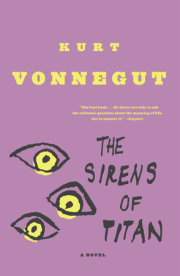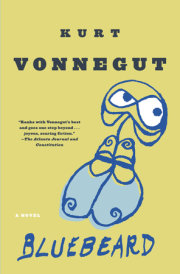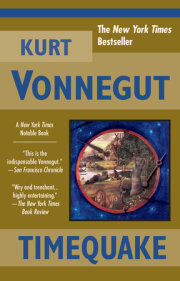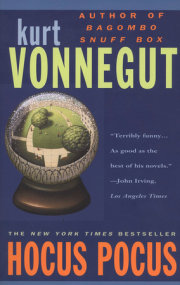Preface
Dear Reader:
The title of this book is composed of three words from my novel Cat's Cradle. A wampeter is an object around which the lives of many otherwise unrelated people may revolve. The Holy Grail would be a case in point. Foma are harmless untruths, intended to comfort simple souls. An example: "Prosperity is just around the corner." A granfalloon is a proud and meaningless association of human beings. Taken together, the words form as good an umbrella as any for this collection of some of the reviews and essays I have written, a few of the speeches I have made. Most of my speeches were never written down.
. . .
I used to make speeches all the time. I needed the applause. I needed the easy money. And then, while I was doing my regular routine of Hoosier shit-kicking on the stage of the Library of Congress, a circuit breaker in my head snapped out. I had nothing more to say. That was the end of my speaking career. I spoke a few times after that, but I was no longer the glib Philosopher of the Prairies it had once been so easy for me to be.
The proximate cause of my mind's shutting off in Washington was a question from the floor. The middle-aged man who asked it appeared to me to be a recent refugee from Middle Europe. "You are a leader of American young people," he said. "What right do you have to teach them to be so cynical and pessimistic?"
I was not a leader of American young people. I was a writer who should have been home and writing, rather than seeking easy money and applause.
. . .
I can name several good American writers who have become wonderful public speakers, who now find it hard to concentrate while they are merely writing. They miss the applause.
I do think, though, that public speaking is almost the only way a poet or a novelist or a playwright can have any political effectiveness in his creative prime. If he tries to put his politics into a work of the imagination, he will foul up his work beyond all recognition.
. . .
Among the many queer things about the American economy is this: A writer can get more money for a bungling speech at a bankrupt college than he can get for a short-story masterpiece. What's more, he can sell the speech over and over again, and no one complains.
. . .
People complain so rarely about bad speeches, even speeches costing a thousand dollars and more. That I have wondered if anybody really hears them. And I received an interesting opinion on how people listen to them right before my speech to the American Academy of Arts and Letters and the National Institute of Arts and Letters, which is in this book.
I was seasick with dread before I gave the speech. I was seated between a famous old architect, and the president of the Academy. We were three skinny, blank-faced human beings, in full view of the audience. We spoke as convicts in motion pictures to, when planning a break under the eyes of guards.
I told the architect how frightened I was. I expected him to comfort me. But he replied pitilessly, and in a voice the president could hear, that the president had read my speech and detested it.
I asked the president if this was so.
"Yes," he said. "But don't worry about it."
I reminded him that I still had to deliver the detestable speech.
"Nobody is going to listen to what you say," he assured me. "People are seldom interested in the actual content of a speech. They simply want to learn from your tone and gestures and expressions whether or not you are an honest man."
"Thank you," I said.
"I will bring the meeting to order," he said. And he did. And I spoke.
. . .
In this miracle age of organ transplants and other forms of therapeutic vivisection, it would be wrong of me to protest my being dissected while still alive. Two nice young college professors, Jerome Klinkowitz of the University of Northern Iowa, and John Somer of Kansas State Teachers College, are doing just that to me. They have published one seemingly posthumous volume, The Vonnegut Statement, a collection of essays about me. And they proposed to do another: a collection of everything I had ever written and which had never been put between hard covers before.
They presented my publisher with an appallingly complete bibliography. I keep no records of my work, and had been delighted to forget a lot of it. Klinkowitz and Somer refreshed my memory with their rap sheet. Their intentions were friendly. They thought of themselves as archaeologists, unearthing primitive artifacts which might help to explain whatever it is I have become. But some of the ugliest artifacts were actually of very recent origin. When I examined all the crap indubitably associated with my body, I did not feel like the ghost of Tutankhamen. I felt like a person who was creepily alive, still, and justly accused of petty crimes.
. . .
From all that crap, I have called this volume. I would not have been able to do it without the help of Klinkowitz and Somer, who knew where almost all the bodies were hidden. There are only three or four works of mine they know nothing about. Not even the ordeal of the veglia, said to be the most excruciating torture ever devised by Earthlings, could compel me to reveal where those three or four were published--and when.
This is not a book of my laundry lists, so to speak. I am pleased to have most of this stuff preserved. There are several short stories which have never been collected. I am content to leave them that way, except for one, Fortitude, a screenplay for an unproduced short science-fiction film. That is the only fiction in this book.
Everything else in here shows me trying to tell the truth nakedly, without the ornaments of fiction, about this or that. Which brings us to a discussion of the place of the "New Journalism," as opposed to fiction, in the literature of modern times.
. . .
Thucydides is the first New Journalist I know anything about. He was a celebrity who put himself at the center of the truths he was trying to tell, and he guessed when he had to, and he thought it worthwhile to be charming and entertaining. He was a good teacher. He did not wish to put his students to sleep with the truth, and he meant to put the truth into strikingly human terms, so his students would remember.
He is to be admired for his usefulness and good citizenship, and so is anybody who writes or teaches that way today. I am crazy about Hunter Thompson, for instance, on the account, and I say so in a review I have included in this book.
Am I a New Journalist? I guess. There's some New Journalism in here--about Biafra, about the Republican Convention of 1972. It's loose and personal.
But I am not tempted to do much more of that sort of stuff. I have wavered some on this, but I am now persuaded again that acknowledged fiction is a much more truthful way of telling the truth than the New Journalism is. Or, to put it another way, the very finest New Journalism is fiction. In either art form, we have an idiosyncratic reporter. The New Journalist isn't free to tell nearly as much as a fiction writer, to show as much. There are many places he can't take his reader, whereas the fiction writer can take the reader anywhere, including the planet Jupiter, in case there's something worth seeing there.
In either case, the principal issue, as I learned at the American Academy of Arts and Letters, is whether or not the person who is trying to tell the truth gives the impression of being an honest man.
. . .
I am reminded now, as I think about news and fiction, of a demonstration of the difference between noise and melody which I saw and heard in freshman physics lecture at Cornell University so long ago. (Freshman physics is invariably the most satisfying course offered by any American university.) The professor threw a narrow board, which was about the length of a bayonet, at the wall of the room, which was cinder block. "That's noise," he said.
Then he picked up seven more boards, and he threw them against the wall in rapid succession, as though he were a knife-thrower. The boards in sequence sang the opening notes of "Mary Had a Little Lamb." I was enchanted.
"That's melody," he said.
And fiction is melody, and journalism, new or old, is noise.
. . .
He gave a lecture on equilibrium, too. He stood behind a twenty-foot row of waist-high cabinets in front of the room. He had a string tied to his finger. And, as he said this and that about equilibrium, he appeared to be playing with a yo-yo, which we couldn't see because of the cabinets.
He kept that up for the better part of an hour. At last he raised his arm so we could see what was on the other end of the string. It was a piece of wood molding twenty-feet long, with the string tied to its midpoint.
"That," he said, "is equilibrium."
I keep losing and regaining my equilibrium, which is the basic plot of all popular fiction. And I myself am a work of fiction. I remember I was with the theatrical producer Hilly Elkins one time. He had just bought the film rights to Cat's Cradle, and I was attempting to become urbane. I made some urbane remarks, and Hilly shook his head, and he said, "No, no, no. No, no. Go for Will Rogers, not for Cary Grant."
. . .
I happen to have my equilibrium just now. I received a note from a twelve-year-old this morning. He had read my latest novel, Breakfast of Champions, and he said, "Dear Mr. Vonnegut: Please don't commit suicide." God love him. I have told him I am fine.
This book is dedicated to a person who helped me to regain my equilibrium. I say she cronkled me. That is another coined word. She came to me with an expressed wish to "chronicle" my wonderful life from day to day on photographic film. What eventuated was much deeper than mere chronicling.
. . .
The Playboy Interview with me in this book is almost as fictitious as my fleeting imitation of Cary Grant. It is what I should have said, not what I really said. Playboy showed me a typescript of what I had said into their tape recorder, and it was obvious to me that I had at least one thing in common with Joseph Conrad: English was my second language. Unlike Conrad: English was my second language. Unlike Conrad, I had no first language, so I went to work on the transcript with pen and pencil and scissors and paste, to make it appear that speaking my native tongue and thinking about important matters came very easily to me.
This is what I find most encouraging about the writing trades: They allow mediocre people who are patient and industrious to revise their stupidity, to edit themselves into something like intelligence, they also allow lunatics to seem saner than sane.
. . .
Here is my understanding of the Universe and mankind's place in it at the present time:
The seeming curvature of the Universe is an illusion. The Universe is really as straight as a string, except for a loop at either end. The loops are microscopic.
One tip of the string is forever vanishing. Its neighboring loop is forever retreating from extinction. The other end is forever growing. Its neighboring loop is forever pursuing Genesis.
In the beginning and in the end was Nothingness. Nothingness implied the possibility of Somethingness. It is impossible to make something from nothing. Therefore, Nothingness could only imply Somethingness. That implication is the Universe--as straight as a string, as I've already said, except for a loop at either end.
We are wisps of that implication.
The Universe does not teem with life. It is inhabited at only one point by creatures who can examine it and comment on it. That point is the planet Earth, which is forever at the exact center of the implication, midway between tips.
All the twinkles and glints in the night sky might as well be sparks from a cowboy's campfire, for all the life or wisdom they contain.
. . .
As for what happened to some of the people in this book: Not nearly as many Biafrans were butchered by the Nigerians at the end of the war as I had thought would be. The Nigerians were merciful. The brains of many Biafran children are probably damaged permanently by starvation caused by the Nigerians' blockade.
At the minimum, those damaged children, at the exact middle of the Universe, will be more honorable than Richard M. Nixon and more observant than God.
Mr. Nixon himself is a minor character in this book. He is the first President to hate the American people and all they stand for. He believes so vibrantly in his own purity, although he has committed crimes which are hideous, that I am bound to conclude that someone told him when he was very young that all serious crime was sexual, that no one could be a criminal who did not commit adultery or masturbate.
He is a useful man in that he has shown us that our Constitution is a defective document, which makes a childlike assumption that we would never elect a President who disliked us so. So we must amend the Constitution in order that we can more easily eject such a person from office and even put him in jail.
That is my chief Utopian scheme for the moment. My longer-range schemes have to do with providing all Americans with artificial extended families of a thousand members or more. Only when we have overcome loneliness can we begin to share wealth and work more fairly. I honestly believe that we will have those families by-and-by, and I hope they will become international.
. . .
I had hoped to include some poetry in this volume, but discovered that I have in all these years written only one poem which deserves to live another minute. This is it:
We do,
Deedley do, doodley do, doodley do,
What we must,
Muddily must, muddily must, muddily must;
Muddily do,
Muddily do, muddily do, muddily do,
Until we bust,
Bodily bust, bodily bust, bodily bust.
One of the lost pieces of mine which I hope Professors Klinkowitz and Somer will never find has to do with my debt to a black cook my family had when I was a child. Her name was Ida Young, and I probably spent more time with her than I spent with anybody--until I got married, of course. She knew the Bible by heart, and she found plenty of comfort and wisdom in there. She knew a lot of American history, too--things she and other black people had seen and marveled at, and remembered and still talked about, in Indiana and Illinois and Ohio--and Kentucky and Tennessee. She would read to me, too, from an anthology of sentimental poetry about love which would not die, about faithful dogs and humble cottages where happiness was, about people growing old, about visits to cemeteries, about babies who died. I remember the name of the book, and wish I had a copy, since it has so much to do with what I am.
The name of the book was More Heart Throbs; and it was an easy jump from that to The Spoon River Anthology, by Edgar Lee Masters, to Main street, by Sinclair Lewis, to U.S.A., by John Dos Passos, to my thinking now. There is an almost intolerable sentimentality beneath everything I write. British critics complain about it. And Robert Scholes, the American critic, once said I put bitter coatings on sugar pills.
It's too late to change now. At least I am aware of my origins--in a bit, brick dreamhouse designed by my architect father, where nobody was home for long periods of time, except for me and Ida Young.
. . .
There is a piece in this book about Tony Costa, a Cape Codder who was a friend of my daughter Edith. He was accused of several murders. It was decided that he was insane, and thus beyond ordinary punishment. I have heard from him. He cannot believe that a decent, sensible person like himself could possibly have done the killing the police thought he had done.
As his trial approached, incidentally, he was the most famous American then accused of mass murder. At least two books were being written about him by big-time reporters.
And then, on the other shore of the continent, Charles Manson and some members of his artificial extended family were arrested for murdering celebrities. Costa himself ceased to be a celebrity--became overnight what he had been in the beginning, a nobody, a mere wisp of an implication.
That is what I am too. That is what my parents were. Wisps of implications reproduce. I myself have fathered three wisps, and have adopted three more. It is all so spooky. On top of that, I honestly believe I am tripping through time. I honestly believe I am tripping through time. Tomorrow I will be three years old again. The day after that I will be sixty-three.
This book may stabilize my perceptions somewhat. It is, after all, a sort of map of places I've supposedly been and things I've supposedly thought during a period of about twenty years. I have arranged these clues in supposedly chronological order. If time is the straight and uniform string of beads most people think it is, and if I have matured gracefully, then the second half of this book should be better than the first half.
This is not the case. I find scant evidence in my nonfiction that I have matured at all. I can't find a single idea I hadn't swiped from somebody else and enunciated plonkingly by the time I reached the seventh grade.
My adventures in the writing of fiction, however, have been far more surprising and amusing, to me, at least. I may actually have done some sort of growing up in that field. That would be nice, if that were so. It might prove that works of the imagination themselves have the power to create.
If a person with a demonstrably ordinary mind, like mine, will devote himself to giving birth to a work of the imagination, that work will in turn tempt and tease that ordinary mind into cleverness. A painter friend, James Brooks, told me last summer, "I put the first brush stoke on the canvas. After that, it is up to the canvas to do at least half of the work." The same might be said for writing paper and clay and film and vibrating air, and for all the other lifeless substances human beings have managed to turn into teachers and playmates.
I am speaking mostly about Americans. I don't know much about other countries. And I thought for a while that Americans might actually increase their wisdom through experiments with their body chemistry, or with meditation techniques borrowed from Asia. I now have to say that all such voyages have returned to American banality without any artifacts, and with adventure stories stimulating only to themselves.
So I now believe that the only way in which Americans can rise above their ordinariness, can mature sufficiently to rescue themselves and to help rescue their planet, is through enthusiastic intimacy with works of their own imagination. I am not especially satisfied with my own imaginative works, my fiction. I am simply impressed by the unexpected insights which shower down on me when my job is to imagine, as contrasted with the woodenly familiar ideas which clutter my desk when my job is to tell the truth.
Copyright © 1999 by Kurt Vonnegut. All rights reserved. No part of this excerpt may be reproduced or reprinted without permission in writing from the publisher.


